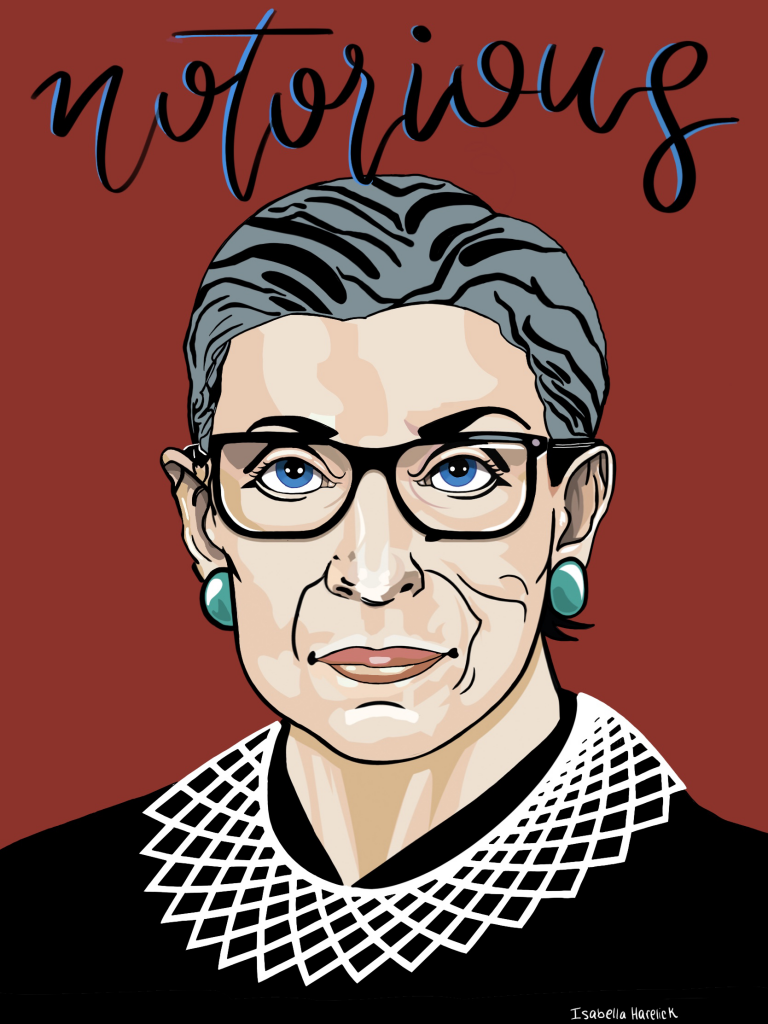Ruth Bader Ginsburg: “Fight for the things you are about, but do it in a way that will lead others to join you.”
Supreme Court Justice Ruth Bader Ginsburg, champion of women’s rights and gender equality, passed away on September 18, 2020, as a result of complications from metastatic pancreatic cancer. In his statement, Chief Justice John G. Roberts, Jr. said: “Our Nation has lost a jurist of historic stature. We at the Supreme Court have lost a cherished colleague. Today we mourn, but with confidence that future generations will remember Ruth Bader Ginsburg as we knew her — a tireless and resolute champion of justice.”
Ginsburg has made history time and time again. Beginning in college, she became the first person to be on both the Harvard and Columbia law reviews. Despite being at the top of her class, Ginsburg said “I struck out on three grounds. I was Jewish, a woman, and a mother. The first raised one eyebrow; the second, two; the third made me indubitably inadmissible.”
However, facing relentless discrimination, Ginsburg continued her fight for social justice. Ginsburg became the second woman appointed to the Supreme Court in 1993. She devoted her career to helping marginalized people, playing a crucial role in the Obergefell v. Hodges decision in 2015, which legalized same-sex marriage throughout the nation. In Ledbetter v. Goodyear Tire & Rubber Company, 2007, a gender discrimination case in which Lilly Ledbetter discovered a pay disparity between herself and her male co-workers, the ruling was 5-4 in favor of Goodyear. Although Ginsburg was not in the majority in the ruling, she used her dissent, an otherwise technical document, to garner public awareness about the gender wage gap. Two years later, the Lilly Ledbetter Fair Pay Act was signed into law; it replaced another ruling which previously mandated the filing of a wage discrimination case within a rigid period of 180 days of the start of said discrimination, and it requires employers to implement non-discriminatory wages.
RHS students remember Justice Ginsburg as a trailblazer for women’s rights and for persistence in fighting for equality. Lily Williams recalls Ginsburg as “…an amazing justice who did so much to further women’s rights…”, adding that she “… will be greatly missed.”
Yea jin Lee describes Ginsburg as “… an important figure who actively advocated for gender equality…” and noted how “…[Ginsburg] always presented a strong voice about these issues before and after she was on the Supreme Court.”
Dina Guemeryl depicts the late justice as “… an inspiration to many women, as she defied gender boundaries… ”, highlighting the fact that “… despite her fight with multiple cancers, she rarely missed work during her treatment.”
While the political consensus around Justice Ginsburg’s death has painted her as a legendary figure, fighting on in an unrelenting pursuit of equality, Ginsburg’s death has left a political quagmire in its wake. NPR reports that days preceding her death, Ginsburg told her granddaughter, “My most fervent wish is that I will not be replaced until a new president is installed.” Senate Republicans are completely unfazed by her dying wish, attempting to solidify President Trump’s legacy on the court for decades to come by establishing a 6-3 conservative majority on the court.
Sanjna Rajagopalan
Staff Writer
Graphic: Isabella Harelick

